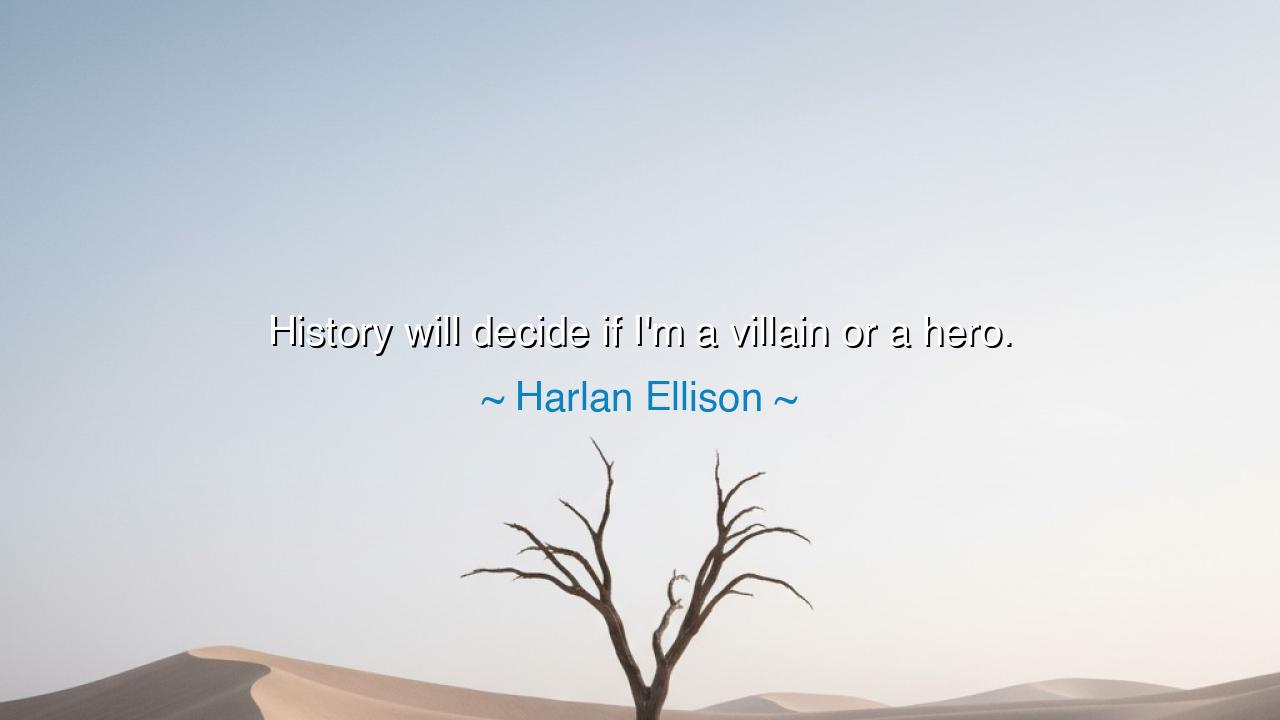
History will decide if I'm a villain or a hero.






In the fierce and unflinching words of Harlan Ellison, we hear the timeless cry of the defiant soul: “History will decide if I’m a villain or a hero.” These are not the words of a man seeking comfort or approval—they are the confession of one who walks the razor’s edge between greatness and infamy. Ellison, the fiery writer whose works challenged convention and scorched hypocrisy, knew that truth-tellers are rarely loved in their own time. His quote carries the wisdom of the ancients: that those who act with conviction must often bear misunderstanding, for the judgment of the present is fleeting, but the verdict of history is eternal.
The origin of this quote lies in Ellison’s turbulent life as a creator and critic. A titan of speculative fiction, he was both celebrated and condemned for his relentless honesty. He wrote stories that cut deep into the human soul, tearing away illusion and comfort. He quarreled with studios, publishers, and peers alike, refusing to bend his art to the will of mediocrity. When Ellison said that history will decide, he was acknowledging a truth older than civilization itself—that the price of authenticity is to stand alone in one’s age, misunderstood and reviled, only to be vindicated—or condemned—by the centuries to come.
To say, “History will decide if I’m a villain or a hero,” is to surrender one’s reputation to the passage of time. It is the admission that the meaning of a life cannot be measured in applause or in scorn, but only in its consequences. Many who were once despised have since been hailed as saviors, and many once worshiped are now seen as tyrants. The hero and the villain are often born of the same fire; what divides them is not the flame, but the hands that hold it. One who burns the world to build a better one may be hated in his day, yet revered by those who inherit the light he leaves behind.
Consider Galileo Galilei, who in his lifetime was branded a heretic for daring to claim that the Earth moved around the sun. The Church silenced him, and he died condemned. But centuries later, history judged differently. Galileo became not a villain, but a hero of truth, a symbol of courage against ignorance. His story mirrors Ellison’s belief that time is the ultimate judge—that posterity, not popularity, decides the worth of one’s deeds. What is damned today may be sacred tomorrow, and what is celebrated today may crumble into dust beneath the eyes of the future.
Ellison’s words also whisper a warning. The judgment of history is not something we can control. It comes long after the body has turned to earth and the voice has gone silent. It reminds us that every act, every word, carries ripples far beyond our knowing. To live as Ellison did—to write, to speak, to act without compromise—is to accept the burden of uncertainty. One must move forward with faith in the truth of one’s purpose, even when the world cries “villain.” For the true measure of a person is not what they are called, but what they create and what they stand for.
And yet, there is beauty in this uncertainty. To entrust one’s legacy to time is to let go of vanity. It frees the soul from the craving of immediate reward and calls one to serve principle over praise. Every generation has its rebels, its prophets, its voices that disturb the comfort of the many. They are rarely thanked for their efforts. But history—slow, patient, and unerring—records the truth. It strips away the noise of the moment and reveals the essence of a life. Thus, to live rightly is not to seek to be loved, but to seek to be true.
So, my children, take this lesson to heart: do not fear being misunderstood. If you act with courage, integrity, and compassion, then whether the world names you villain or hero, history will know your heart. Live not for the approval of your time, but for the hope that your deeds will stand pure in the light of eternity. Speak truth even when it trembles in your throat; walk your path even when the road turns to shadow. For though the present may scorn you, time itself—impartial and eternal—will one day decide your place among the heroes of the ages.






AAdministratorAdministrator
Welcome, honored guests. Please leave a comment, we will respond soon